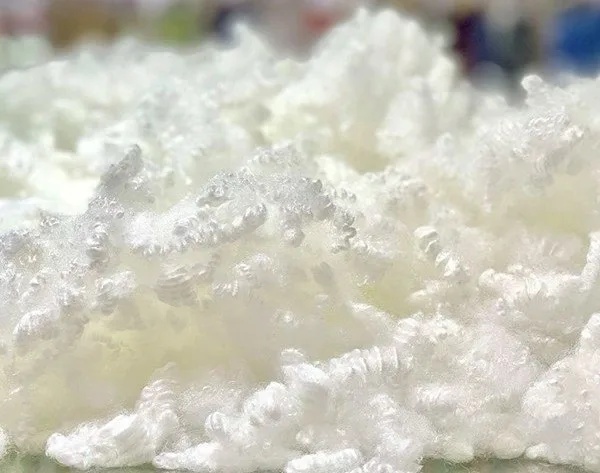Polyester fiber is a synthetic fiber made from polyethylene terephthalate (PET) and is used in construction to improve the strength and durability of materials such as concrete, mortars, and asphalt. It plays an important role in reducing shrinkage, cracking, and surface wear, thereby significantly enhancing the strength and longevity of buildings and structures. Its resistance to environmental wear makes it a reliable solution for projects exposed to harsh conditions. Furthermore, these fibers are highly adaptable, allowing for seamless integration into a wide range of applications, thus providing versatile reinforcement solutions in various construction projects.
Polyester fibers manufacturing process;
1. Raw Material Preparation
Polyester fibers are primarily made from two raw materials: terephthalic acid and ethylene glycol, derived from petrochemical sources.
2. Polymerization
The raw materials undergo esterification and polycondensation to form polyethylene terephthalate (PET) resin. Terephthalic acid reacts with ethylene glycol, producing a polymer through the removal of water.
3. Spinning
The PET resin is melted and extruded through spinnerets to form continuous filaments in a process called melt spinning. These fibers are then drawn to align their molecular structure, increasing strength and elasticity.
4. Texturing (Optional)
Fibers may undergo crimping to introduce waves or bends, enhancing volume and texture.
5. Cutting and Baling
For staple fibers, continuous filaments are cut into shorter lengths (usually 38mm to 51mm) and baled for easier handling.
Applications of Polyester Fibers
- RCC buildings and structures
- Shotcreting
- Precast concrete products
- Pavements and slabs
- Marine structures
- Tunnel linings
- Bridge decks
- Retaining walls
- Decorative concrete finishes
- Wastewater treatment facilities
- Flooring underlayment etc.
- Slope stabilzation
- Landscaping
Advantages of Polyester Fibers
- Increases impact resistance of concrete
- Enhances bonding between concrete layers
- Improves flexural strength and ductility
- Reduces permeability, enhancing waterproofing
- Assists in preventing freeze-thaw damage
- Helps achieve higher quality control in concrete mixes
- Provides resistance to chemical attacks
- Aids in quick setting and curing of concrete
- Minimizes the risk of surface spalling
- Contributes to sustainable construction practices
- Allows for easier integration with other materials
- Supports innovative design solutions in construction
Polyester fiber can be used in conjunction with various materials in construction, including:
- Concrete
- Mortars
- Asphalt
- Plaster
- Geopolymers
- Composites
- Geotextiles
Types of Polyester fibers
1. Polyester Staple Fiber (PSF)
Polyester Staple Fiber (PSF) consists of shorter lengths of polyester fibers, which can be spun into yarn or used in non-woven applications. In construction, PSF is utilized for thermal insulation, roofing materials, and non-woven geotextiles. Its lightweight and soft characteristics provide excellent moisture-wicking properties, which help in regulating humidity and enhancing indoor air quality. The advantages of PSF include its versatility and ability to improve the comfort and energy efficiency of buildings. Common applications include insulation blankets, roofing felts, and geotextiles that aid in soil stabilization and drainage.

2. Recycled Polyester Fiber
Recycled Polyester Fiber is made from post-consumer plastic waste, such as PET bottles, making it an eco-friendly choice in construction. This fiber type supports sustainable building practices by reducing landfill waste and the reliance on virgin materials. Recycled polyester maintains many of the performance characteristics of virgin polyester, such as durability and resistance to environmental factors. In construction, it is commonly used in insulation, carpeting, and various textiles. By incorporating recycled polyester into building materials, construction projects can enhance their sustainability profile while ensuring high performance and quality.

3. High-Strength Polyester Fiber
High-Strength Polyester Fiber is engineered for applications requiring superior durability and strength. This fiber offers exceptional tensile strength and fatigue resistance, making it suitable for heavy-duty construction applications. Its main advantage is its ability to enhance the performance of composite materials, often used in structural applications and retrofitting existing structures. In construction, high-strength polyester fibers are incorporated into concrete and other composite materials, improving load-bearing capabilities and extending the lifespan of buildings and infrastructure. Its resistance to environmental degradation further contributes to the durability of construction projects.

4. Polyester Fiber Reinforced Concrete (PFRC)
Polyester Fiber Reinforced Concrete (PFRC) involves the integration of polyester fibers into concrete mixes, enhancing their mechanical properties. The primary advantage of PFRC is its improved tensile strength and reduced cracking potential, which contributes to the overall durability of concrete structures. This type of concrete is particularly useful in pavements, precast components, and structural applications where performance is importantl. The incorporation of polyester fibers helps distribute loads evenly within the concrete, minimising the risk of failure and extending the service life of the structure.
Conclusion
Polyester fiber stands out as an important innovation in construction materials. It improves the resilience of construction materials, helping to create stronger, more durable structures that can withstand the test of time. As the industry evolves, the use of polyester fiber will continue to lead to safer, more durable, and sustainable structures, reinforcing its importance in construction and infrastructure projects.

